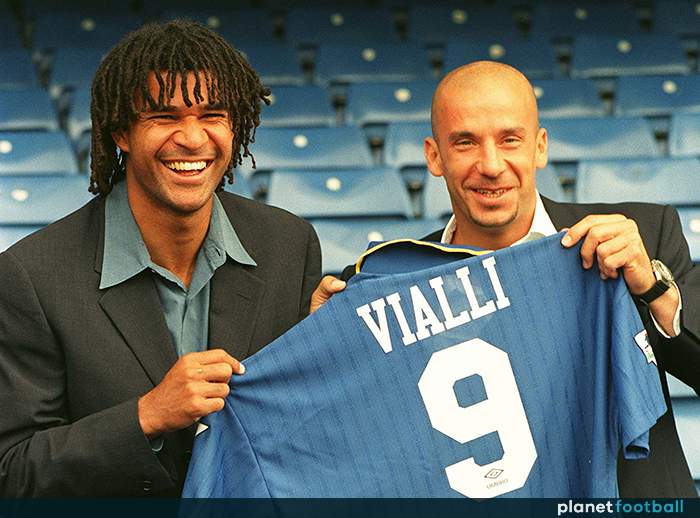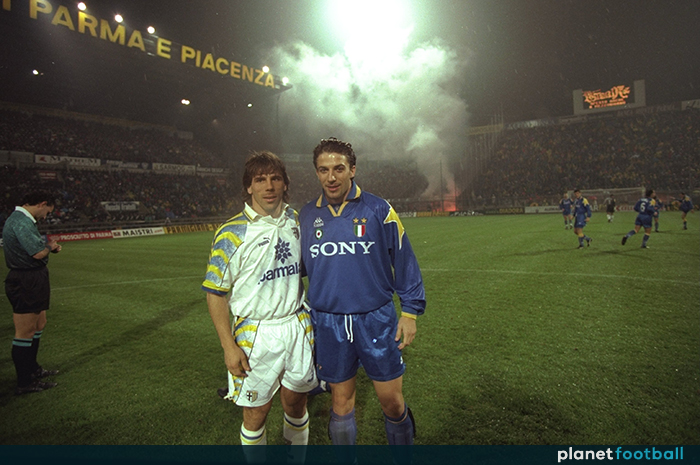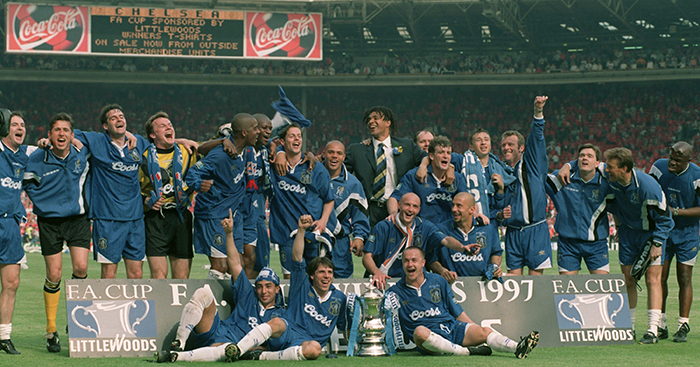A tribute to the glorious Gianfranco Zola, an unbelievable PL bargain
He might not have won the number of trophies as some of the players who followed him, but make no mistake, Gianfranco Zola will go down as one of Chelsea’s greatest ever players – and he cost them just £4.5million.
Zola left Chelsea in 2003, less than a week before Roman Abramovich completed his takeover of the club. As the Blues built towards their first Premier League title in 2005, Zola was seeing out his career at Cagliari.
But what he won – or didn’t win – at Stamford Bridge is irrelevant. He provided joy in other ways. To everyone who saw him play, few can compare. And as bargains go, there have been few better.
The problem
Chelsea were on the verge of a revolution. Ruud Gullit had taken over from new England boss Glenn Hoddle in the summer of 1996, but this was not the Chelsea we know today.
They had not won a major trophy since the 1971 Cup Winners’ Cup, after which they spent the better part of 20 years yo-yoing between the First and Second Divisions. The six seasons prior to Gullit’s appointment had seen them finish 11th four times and 14th twice.
It was now stick-or-twist time for Chelsea, and regardless of his stellar reputation as a player, appointing Gullit as player-manager was a bold left-field move for Chelsea.
He was just the third ever manager from outside the UK and Ireland to take charge of an English club, following in the footsteps of disastrous duo Jozef Venglos at Aston Villa and Ossie Ardiles at Tottenham.
Chelsea’s board would not have made that kind of appointment in the first place if they didn’t intend for Gullit to do things his way. Sexy football was on its way.
The market
That summer – the first following the ratification of the Bosman ruling – saw the first big influx of foreign players to Premier League clubs, giving the league’s only two managers significant advantages in language, culture, scouting, and reputation.
Arsenal signed Remi Garde and Patrick Vieira on the advice of incoming boss Arsene Wenger, while Gullit looked to Italy, where he had spent eight distinguished years as a player before joining Chelsea.
In came midfielder Roberto Di Matteo from Lazio in a club record transfer of £4.9million and striker Gianluca Vialli from Juventus on a free transfer.
It may not seem like much of an invasion now, but up till that point the only Italian ever to have played in the Premier League was Nottingham Forest flop Andrea Silenzi.
What they could have had
For £4.5m in 1996, Chelsea could have had:
– Less than one-third of Alan Shearer (Blackburn to Newcastle, £15m)
– 78% of Nicky Barmby (Middlebrough to Everton, £5.75m)
– Sasa Curcic and change (Bolton to Aston Villa, £4m)
The signing
Remarkably, Gianfranco Zola didn’t play any top-flight football until he was 23 years old, having spent the first five years of his professional career playing for Serie C sides Nuorese and Torres, both located in Zola’s native Sardinia.
Zola was finally spotted by Napoli general manager Luciano Moggi – now better known for his part in the 2006 Calciopoli scandal – and subsequently brought across the Tyrrhenian Sea to play alongside Diego Maradona, who remarked: “Finally, we’ve got someone who’s smaller than me.”
His first season ended in Serie A triumph as Zola – already an accomplished player – picked up a few tips and tricks from the maestro.
So great was Maradona and his influence that there is little contradiction in Zola being separately quoted saying both “I already knew how to play a bit” and “I learned everything from Diego Maradona”.
"Tú serás mi sucesor". Maradona a Zola en el último gran #Napoli… hasta hoy. pic.twitter.com/hsp4qvcjuG
— El Enganche (@elenganche) January 16, 2016
Zola proved the perfect successor to the great Argentine, even being hand-picked by Maradona himself to inherit Napoli’s No.10 shirt.
Unfortunately, financial difficulties hit the Neopolitan outfit following Maradona’s departure on a drugs ban, which meant they had to sell their best players to survive.
That meant letting Zola go in 1993 to Parma, where he won the UEFA Cup and enjoyed the best goalscoring form of his career, hitting 47 goals in 94 league games in his three full seasons at the club.
However, 1996 was not a happy year for Zola, either at club or international level.
For Italy, he was made the national scapegoat for the humiliating group stage exit from Euro 96 after missing a penalty in their final game, a goalless draw with eventual winners Germany, allowing the unfancied Czech Republic to advance in Italy’s place.
And things didn’t get better when Zola returned back home: new Parma manager Carlo Ancelotti was unbending in his adherence to a 4-4-2 with a flat front two, which allowed no place in the side for Zola, who had always played just behind the main striker.
That left Zola looking for a new club, preferably in a new country, and England seemed the obvious target.
There was talk at the time that Zola met with Manchester United, Newcastle and Tottenham, but after his experience with Ancelotti, Zola will have known that what he really needed was an ambitious manager who knew how to appreciate sexy football…
The legacy
The Independent announced Zola’s signing for Chelsea like this: “It has transpired that Parma have been keen to unload Zola after he fell out with their coach, Carlo Ancelotti, and the Italian club will doubtless be very happy with such a fee for a 30-year-old.”
Oh dear. Zola may not have been the youngest player, but he was an immediate smash hit. It didn’t take long for him to make an impression and show that it was in fact Chelsea who had reason for jubilation at having paid as little as they did.
As Scott Minto told Sky Sports: “It wasn’t until he arrived and you saw him on the training pitch that you suddenly realised you were in the presence of something special. His first touch, I’ve never seen anything like it.”
His first three games for Chelsea didn’t yield any goals for the Italian, but his next five yielded the equivalent of a goal apiece to snap the side out of a five-game winless run.
Despite not signing until November 1996 and making his debut in the Blues’ 13th game of the season, he finished the season just a goal shy of being Chelsea’s top scorer in all competitions, and claimed the Football Writers’ Association Player of the Year.
He is the only player in the 71-year history of the award to have won it having moved mid-season, and one of only two players to have claimed it in his debut season in England (Jurgen Klinsmann is the other).
The eight league goals Zola scored in 1996-97 made a difference of nine points to Chelsea’s Premier League campaign, without which they would have finished eighth and closer on points to the relegation zone than the top of the table.
As it was, they enjoyed a sixth-place finish, the club’s joint second-best since finishing 3rd in 1970.
Zola’s presence and goals also helped Chelsea to win their first piece of silverware in 26 years as they beat Middlesbrough 2-0 in a memorable cup final. It might sound strange now, but Chelsea became many neutral’s favourite team.
Zola helped Chelsea become firmly established as a solid top-six team who always did well in the cups, adding the League Cup, another Cup Winners’ Cup, another FA Cup, the UEFA Super Cup and the Charity Shield to the collection.
After decades of yo-yo-ing and midtable obscurity, Chelsea finally had a team they could be truly proud of, and a lot of that was down to the 5’6” wizard wearing No.25 – a shirt nobody has had the balls to wear for Chelsea since Zola left, despite it not being formally retired by the club.
But more than that, it was the style. As was the theme for the rest of Zola’s career, his goals tended to come either as perfectly struck free-kicks – only Beckham has scored more in the Premier League – or as marvelous solo efforts involving at least one piece of quick-minded, fleet-footed trickery that no other player would even think to attempt.
Chelsea’s greatly improved status helped attract Roman Abramovich to the club but just too late for the Russian to extend Zola’s contract: he had already made a verbal agreement with Serie B Cagliari, back on his native Sardinia.
Abramovich tried to tempt Zola to renege on the deal and return to Chelsea for one more year – at the age of 36, he had been Chelsea’s top scorer with 16 goals as the side finished fourth – but true to his character, he refused to break his word.
Cagliari had spent four years in Serie B, but Zola inspired them to a return to Serie A before staying one more season just to make sure they stayed up. They finished 12th, with Zola scoring a memorable towering header – yes, really – in the 89th minute of a 1-1 draw with champions Juventus on home turf.
It is a testament to Zola’s enormous popularity that when he moved to Cagliari, attendances rose 65%. After he hung up his boots in 2005, they dropped back to their previous levels – despite Cagliari now being an established Serie A side.
Zola won trophies everywhere he played, from Napoli to Parma to Chelsea to Cagliari, but more than that, he won hearts. Can you put a price on that? £4.5million seems far too low.
By Steven Chicken
READ NEXT: Where are they now? Chelsea’s first starting XI under Roman Abramovich
TRY A QUIZ: Can you name Chelsea’s XI from the 1998 UEFA Cup Winners’ Cup final?


























